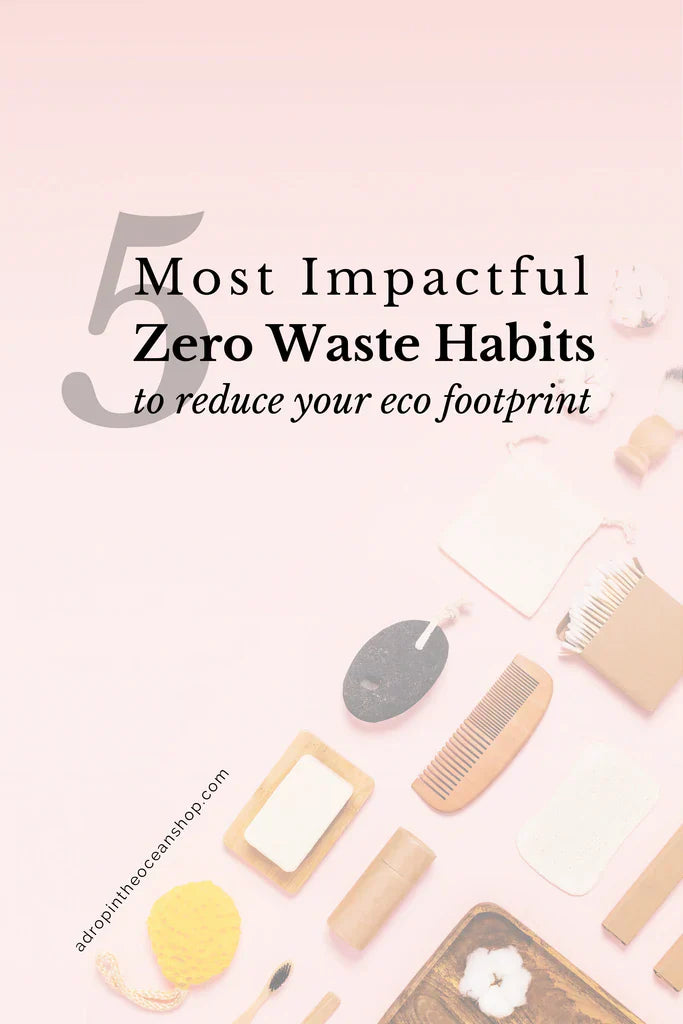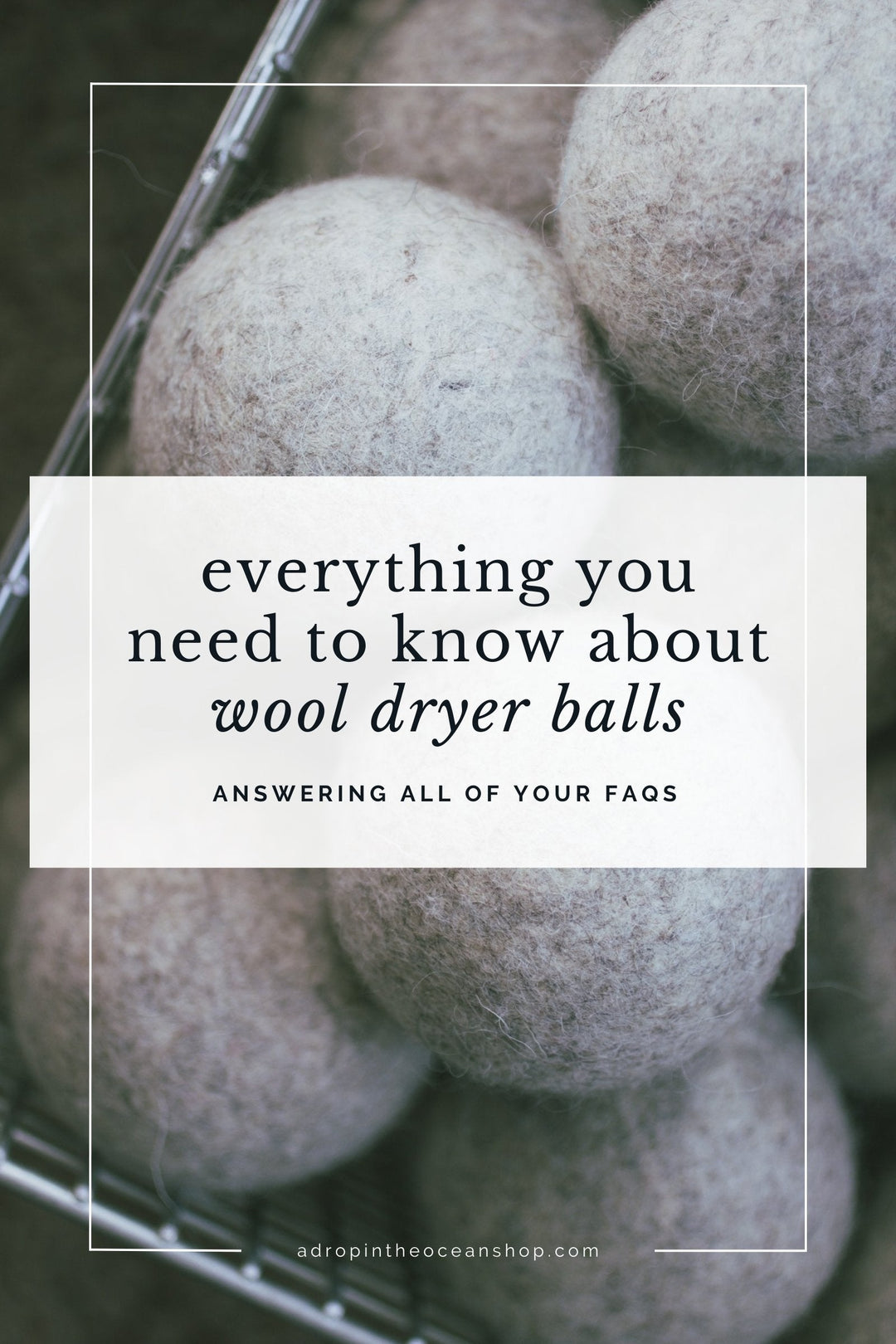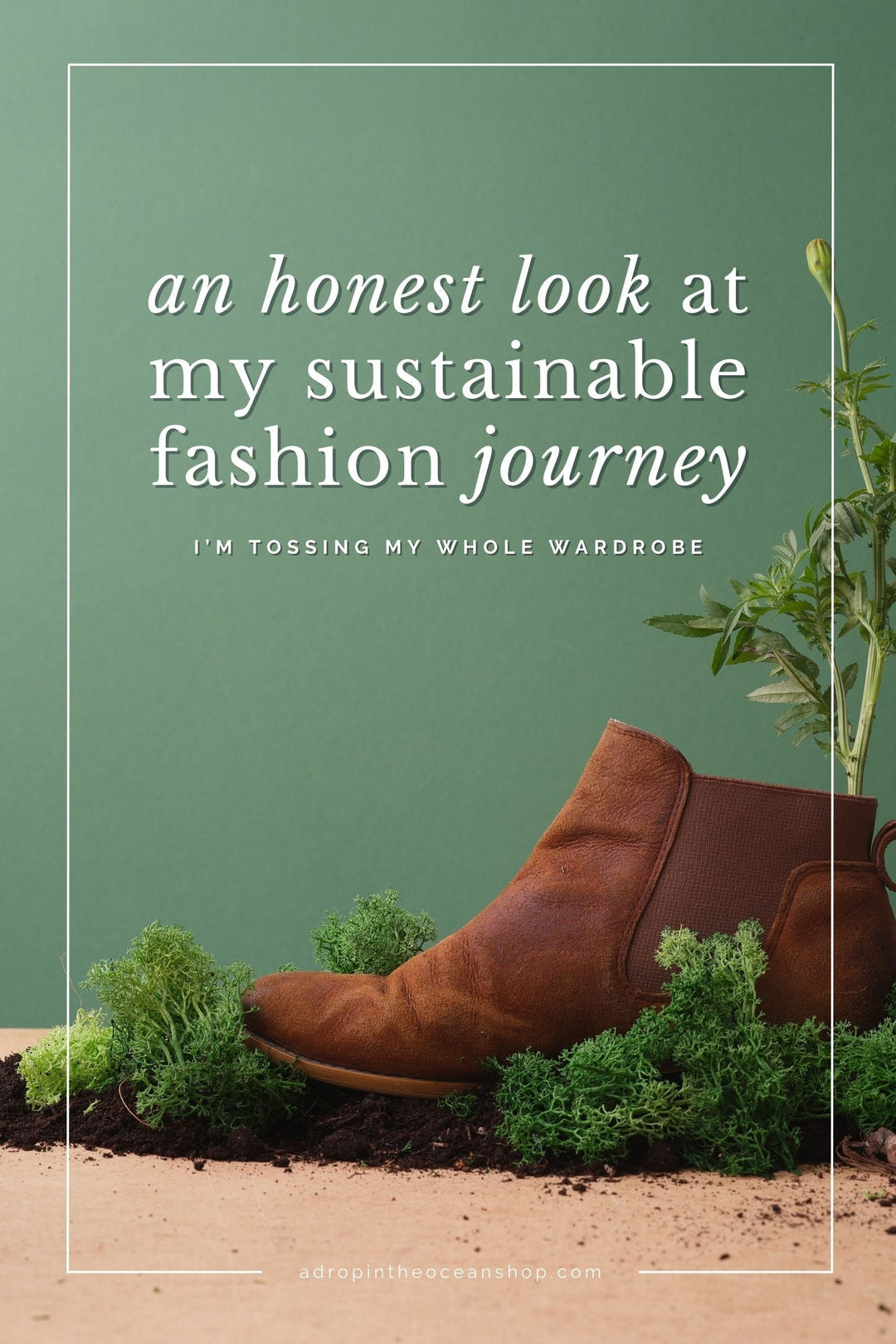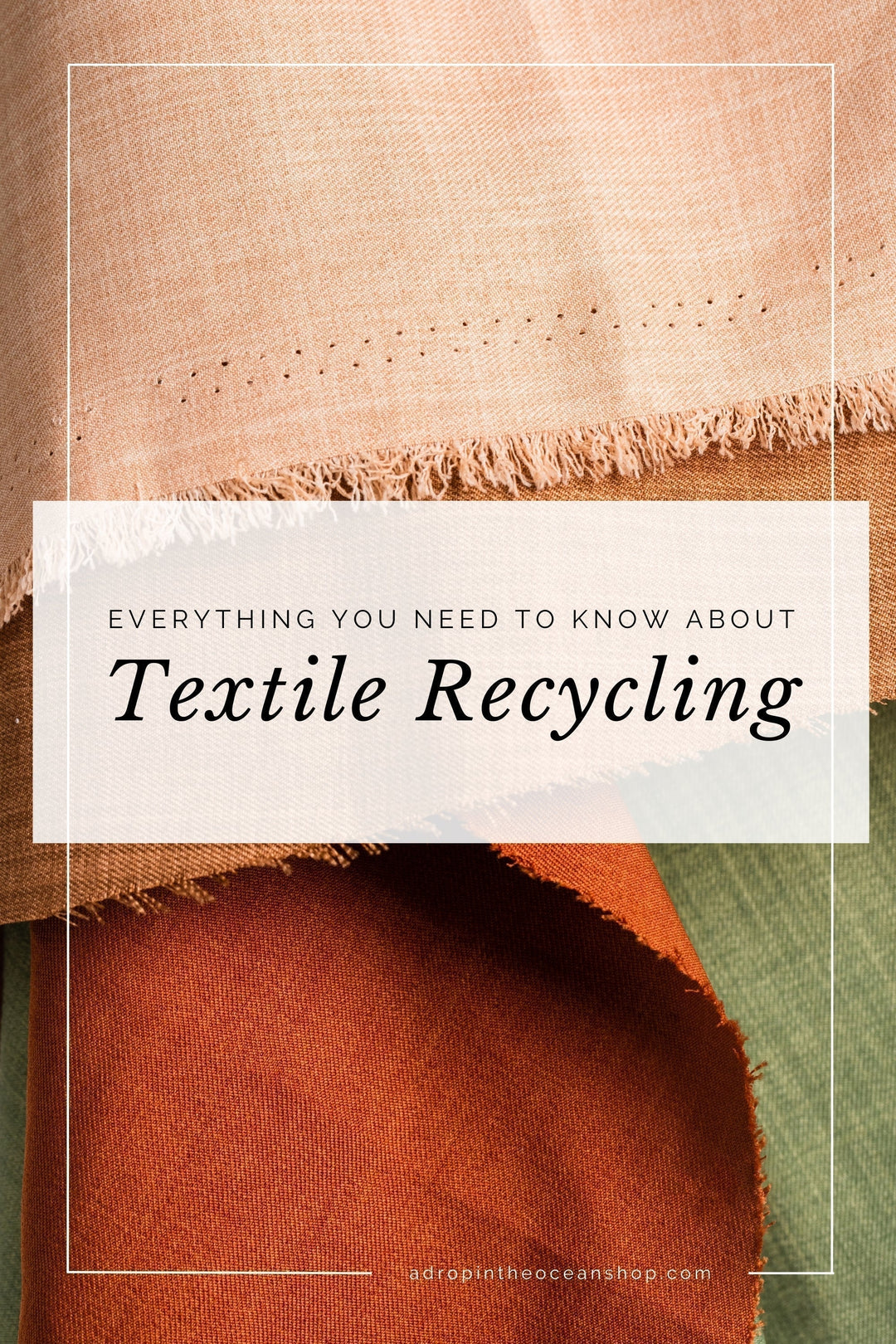The 5 Most Impactful Zero Waste Habits to Reduce Your Eco Footprint

Hello and happy Thursday!
I've returned from my Baja adventures and omgosh I can't wait to share them all with you - and especially to bring you with me next year on our EcoWarrior Retreat.
But for now, as I'm playing catch up, this week I've partnered with our friends at Sustainable Jungle to bring you their take on the 5 Most Impactful Zero Waste Habits to Reduce Your Eco Footprint.
If you're not yet familiar with Sustainable Jungle, you'll want to be after reading these tips. They are an incredible resource of knowledge and community for all things sustainability-related. Whether you're interested in zero waste, slow fashion, gardening, or green tech, they've got something for you. So go check 'em out!
I'll be back next week once I'm caught up. Have a wonderful week, my friend. Talk soon.
Zero waste is a pretty lofty ideal. Where linear cradle-to-grave consumption and disposal turns into a circular economy. One in which we reimagine our use of products so that everything can be reused or repurposed into something else at the end of its life. Which is to say, we throw nothing away.
Between that notion and the zero waste movement popularized with images of tiny trash jars, it’s pretty overwhelming especially considering most of us can fill a trash can in a few days.
And then there’s the increased plastic consumption thanks to the global pandemic. We’re seeing more take-out containers, more restrictions on reusables, and more single-use for the sake of public safety (masks and latex gloves, anyone?).
All this makes the prospect of a zero waste lifestyle, impossible. So how do we do it?
First, we can accept the fact that there is no perfect way to go zero waste (nor is there an end goal). It’s a process, a journey, part of living a more sustainable life.
There are so many little (and big) changes you can make in your life today that can bring about real positive impact, which over time cannot be understated. To illustrate the variety of ways that you can make a difference we detailed a list of 50+ zero waste tips for those looking to live a less wasteful life.
But those 50 things don’t need to happen overnight (or even over the first year!). Our advice, start small, simply focus on one or two and once those are habitual, add another and then another and before you know it your lifestyle will have drastically improved.
But if you want the biggest bang for buck changes, here are the top 5 things that we've changed in our life that have made the biggest dent on our waste generation.
Start composting food, plant, and paper waste.
When we think of waste, we tend to think of plastic as the most insidious form. Want to know what’s worse? Food waste!
It accounts for around 16% of the total solid waste stream. And what’s worse is that another 40% of landfill waste, like food waste, is fully biodegradable. But that’s a good thing, right?
Yes, but just not in a landfill. Biodegradable material needs oxygen to properly breakdown, which is precisely something it does NOT have when buried under tons of garbage. It thus breaks down anaerobically and produces methane gas, a potent greenhouse gas.
While food and other organic waste (like paper products and yard trimmings) make up one of the most prolific categories of waste, it’s one of the most easily avoidable by simply taking up the practice of composting. For us, composting turned a trash can once filled weekly into one filled every couple of months. Seriously!
Aside from taking a huge bite out of unnecessary landfill mass, composting has all sorts of other amazing benefits, namely because it not only diverts waste from landfills but turns it into something environmentally beneficial.
Composting yields humus, which is rich in nutrients, it’s a natural pesticide, fertilizer, and soil amender. Small scale, that adds up to a powerful cocktail for any garden. Large scale, it means higher agricultural yields, fewer chemicals used in farming, and a reduction in overall greenhouse gases by improving the earth’s carbon cycle.
Put it that way composting can’t help but sound pretty cool, huh? But how can you implement it into your life?
Start by learning which of things you’ve been throwing away are actually compostable (or not compostable). Then research different methods of composting to figure out which best suits your lifestyle. Thanks to worm bins and high-tech composters, it’s more accessible than ever, even to those who live in the smallest of apartments. And if you’re lucky enough, your council might even offer a composting service.

Collect hard to recycle (but still recyclable) things.
Of the 5Rs of zero waste, recycling is the last resort, but that doesn’t mean it isn’t still a necessity for things that either don’t yet have an alternative or an alternative means of disposal.
This includes batteries, electronics, textiles, metal, Styrofoam, and more. Such materials are difficult to avoid entirely and while they are perfectly recyclable, there are often limited services that actually do so.
Just because your local recycling center or curbside pickup doesn’t accept them, however, doesn’t mean there aren’t recycling options. Check if there are any nearby private drop-off centers for electronics (like Best Buy) and other specific recyclables.
If your research turns up no local options, turn to mail-in recycling options (less ideal because of shipping emissions but better than the alternative). There are tons of electronic recycling services that will either refurbish electronics for resale or recycle them for parts (sometimes in exchange for a little money!)
TerraCycle is another amazing service that offers mail-in recycling services for just about anything you can imagine (from toothpaste tubes to coffee pods). Just order their Zero Waste Box™ in whatever size you need, and mail in your tricky recyclables.
Always carry a reusable water bottle and coffee cup.
This is an oldie but a goodie.
How many single-use coffee cups do you go through in a week? How about water bottles or plastic cups? Picture every time you go to a coffee shop, quench thirst at the office water fountain, or grab a styrofoam cup from the break room.
Now think of all caffeine craving working stiffs out there doing the same thing. That amounts to an estimated 600 billion coffee cups thrown away each year.
Yet the solution to this problem is so simple, and all that waste can be completely avoided with just a reusable water bottle and coffee cup. Plus, many cafes and gas stations will actually give discounts for bringing in a reusable cup, so it makes sense environmentally AND financially!
While sleek and stylish reusables are trending these days, please don’t buy one if you don’t need it. The most eco friendly water bottle or reusable is the one you already own and that goes for anything you already have.

Carry reusable shopping bags and just don’t use produce bags.
Grocery shopping is one of the biggest barriers to basic zero waste living simply because most of our waste comes from it.
That said, take this one step by step. Don’t feel like you have to be plastic-free from the get go. Start making your weekly grocery trip more sustainable by eliminating one very simple thing: plastic bags.
Plastic bags were a huge bug bear for us. Since switching to reusable bags (which are far larger and stronger than plastic bags), we have completely eliminated plastic shopping bags… and have as a result over the last 5 years reduced a considerable amount of plastic waste.
As for produce bags, 9 times out of 10 you just don’t need them if you wash your produce really well at home. For the occasional smaller items (like Brussels sprouts and mushrooms) either invest in a reusable mesh produce bag or use a paper bag (which you can compost in your shiny new compost bin!).
If you forget your bags, as we all do on occasion, take your purchases directly to the car using your cart.
After going bagless becomes second nature, then you can start tackling the more intimidating problem of food packaging waste by being more choosey about where and how you buy your goods. Co-ops, farmer’s markets, and natural grocery stores (like Whole Foods) offer lots of package-free bulk items.
Aim for zero waste personal care and beauty items.
Aside from food, we buy these products most often so finding zero waste alternatives makes a big difference. Especially when you consider the number of thrown-away shampoo bottles could fill 1,164 football fields each year. And that’s just shampoo!
You’ll find similarly horrifying stats for every. single. bathroom. product.
After learning about these jaw dropping numbers, we’ve become a little obsessed with ensuring we have a zero waste bathroom. Thankfully, you can find most zero waste alternatives for just about every personal care essential from toothpaste to floss to makeup.
Again, no need to find a waste-free alternative for your entire routine all at once. Simply replace your regular products with zero waste options as they need replacing.
While you’re at it, try buying these products (among others) from zero waste online stores (hint hint: A Drop in the Ocean) so that you’re not only buying products in zero waste packaging, but those shipped zero waste, too!

Final Thoughts on 5 Most Impactful Zero Waste Habits
Zero waste doesn’t demand perfection, but it does demand we start...somewhere.
We hope this list gives you a confident place to do just that. While all our lives are different there’s easy changes that each of us can make to do our part.
Even the smallest changes can lead to a big change in your environmental footprint. And when you consider the collective impact, we really do hold the power to change our course.
Speaking of the zero waste community, let’s hear from you! Which of these zero waste habits have you already adopted and have you noticed the difference it’s made? Which one are you excited about adopting?
Related:
7 Reasons to Switch to Shampoo + Conditioner Bars
A Minimalist, Zero Waste Skincare Routine (For All Skin Types)
Izzy Zero Waste Mascara









Leave a comment